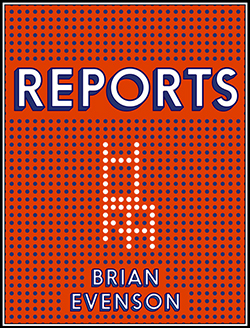REPORTS
Brian Evenson
The Cupboard Pamphlet, 2018
Reviewed by Alyssa Greene
The word report evokes a kind of officialese, bureaucracy and formality—a document that purports to be factual but, through its linguistic stiffness and the constraints of its genre, perhaps obfuscates as much as it reveals. Reports, Brian Evenson’s latest collection of short prose, exploits the oddness and ambiguities of the form.
Each report comprises no more than a few pages of this small volume, an elegantly-designed chapbook from The Cupboard Pamphlet. Most are centered around a commonplace object or activity: “A Report on Chairs,” “A Report on Toes,” “A Report on Lunch.” But the seeming mundanity of the items being “reported” belies the content of each piece, the strange and surprising ways Evenson can transform something as ordinary as a chair into a meditation on the ways objects mediate human relationships, and the ability of language to abstract experience. In “A Report on Chairs,” the memory of assembling an IKEA chair—quite possibly the epitome of mass production and anonymity—for an ex-friend becomes a point of departure for reflecting on the now-defunct relationship, and how that singular item may or may not still tie them together.
Reports frequently explores the nature of objects, and their ability to outlast their owners and creators. In “A Report on Borrowed Items,” Evenson’s speaker reflects on how he has retained borrowed money and books from friends who died unexpectedly. The breach of each death turns the unreturned items into haunting presences, despite the speaker’s knowledge that he is the only one who imbues these objects with meaning, a meaning that will die with him.
Other reports venture further afield from these object-oriented pieces, evoking the kind of paranoia characteristic of much of Evenson’s fiction. In “A Report on Being Followed,” the narrator realizes he is being followed while he himself is in the process of following a third man. By the end of the report, there is a confusion of observer and observed, subject and object: “I started back, only to find everyone on the bus staring at me. Unless they were staring at the man in front of me. Or the man behind.”
As the collection progresses, the reports increasingly call into question the veracity of what is being reported, and the forthrightness of their narrator(s). “A Report on Lemon Reamers” is immediately followed by “A Report on a Report on Lemon Reamers,” in which the narrator admits that he embellished details of a former relationship for dramatic effect. This attempt at honesty is fraught with difficulty: “Even in explaining the moments in which I was not telling the truth I begin to not tell the truth in a different way.” What is at stake here is not just an issue of being honest with the reader. It is the way that writing transforms and colors memory: “This is one terrible thing about writing: the way it leaks out into life, whether you want it to or not.”
Genre bending has always been a strength of Evenson’s, and Reports is no exception. Tonally reminiscent of Jorge Luis Borges, Franz Kafka, and Thomas Bernhard, these short pieces use the formality and purported objectivity of the “report” to show the ways in which language and writing reshape subjective experience. As Evenson writes in “A Report on Translation,” translation comprises “a series of faulty actions and misperformances, which, nonetheless, at their best, at their most slippery, reveal things that the more correct original might not. Shouldn’t writing, at its best, be able to do the same with life?”
Alyssa Greene is an MFA student in Creative Writing at the University of Utah. She holds a PhD in German from Columbia University. She is an editorial assistant for the Lambda Literary Review and, beginning in the fall of 2018, will be a fiction editor with Quarterly West. Her work appears or is forthcoming in Passages North, MoonPark Review, and The Southeast Review.


